Part 11: Estrelas

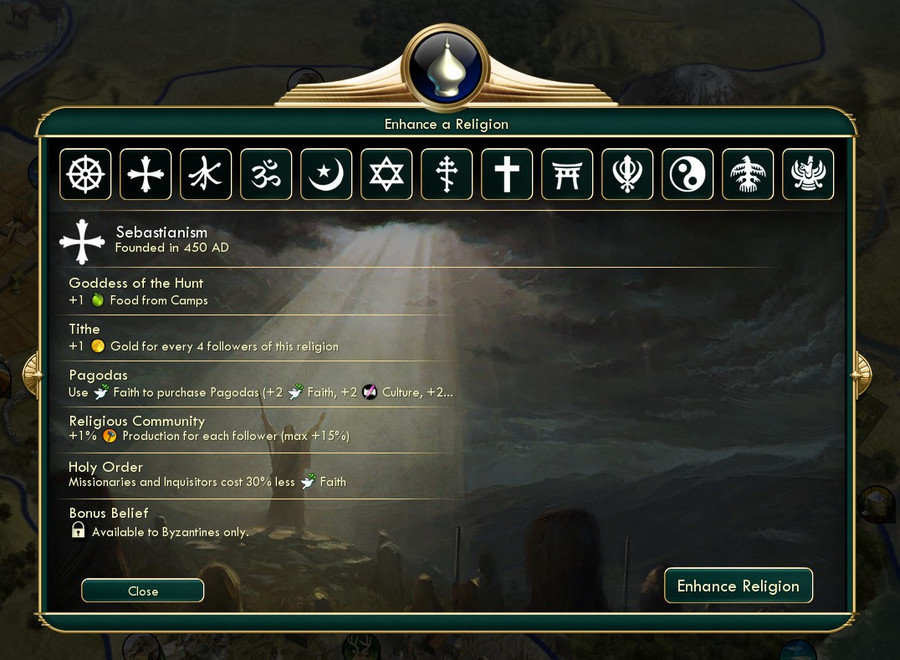
In the city of Lisboa, the dedication of the holy men and philosophers alike contributed to significant changes and evolutions to Sebastião's Laws, and a greater emphasis was placed on popular support for the designs of Dona Maria as well as the elimination of boundaries to joining the clergy.
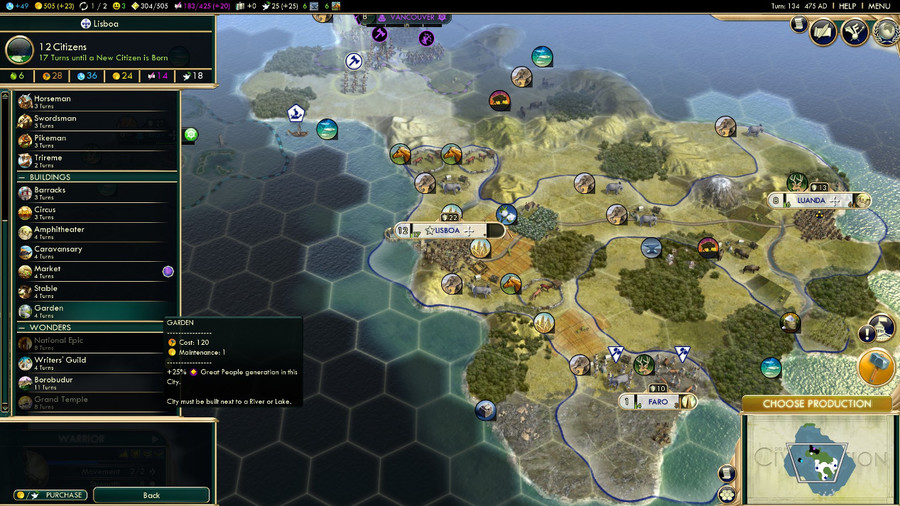
The people of Lisboa thus took to developing their city in a way that would hopefully bring some beauty and inspiration to future generations.
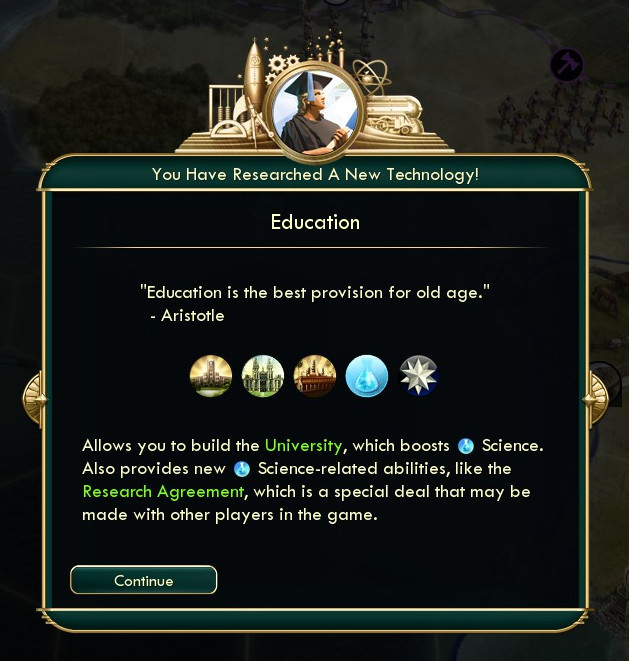
The clergy also went on to develop an educational curriculum with which to educate hunters and philosophers alike.
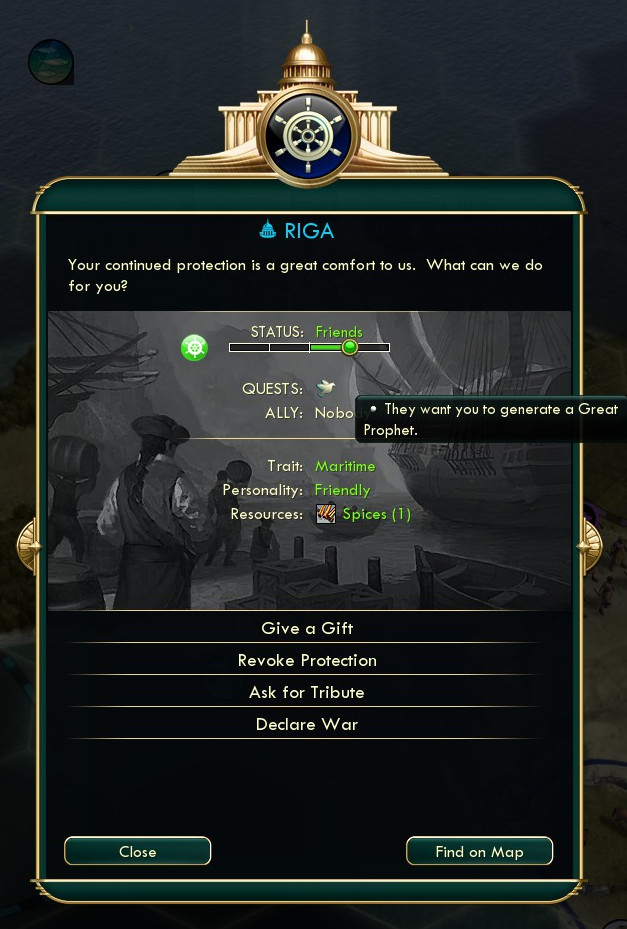
This example was one Riga strove to live up to, and they wanted to see if the Portuguese could create another thinker on par with Sebastião and his contemporary lawmakers.
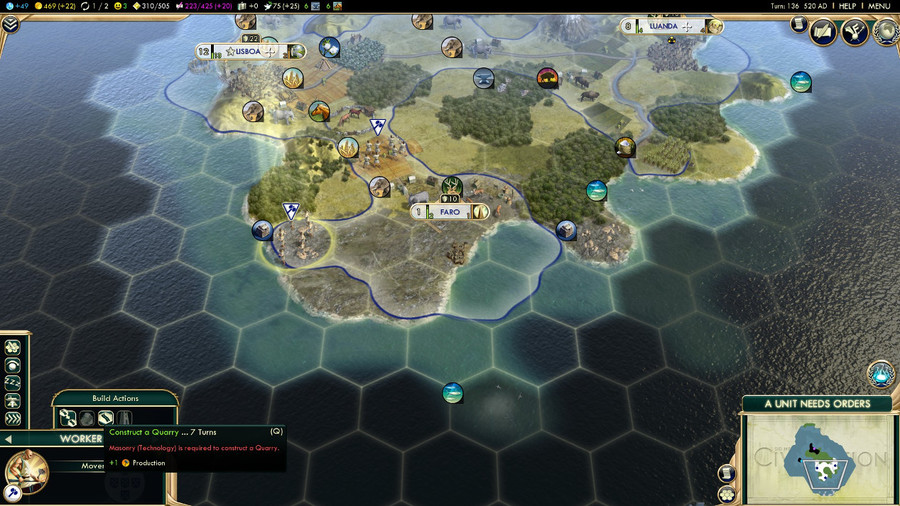
In Faro, the Workers made designs on accessing a cold plain full of large Stones to be used in future manufacturing efforts, but they found themselves somewhat uncertain as to how to best transport and extract them.
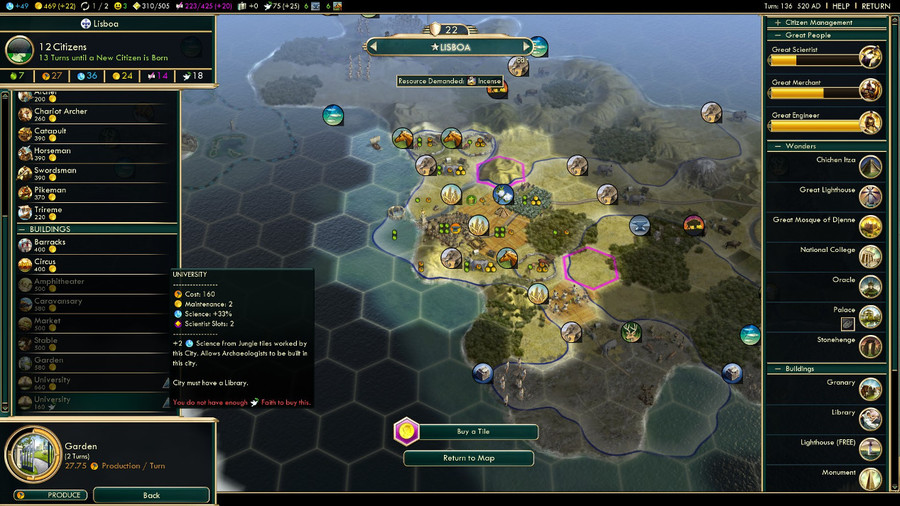
In Lisboa, the clergy began planning for the creation of a new institute of learning to rival the Universidade.
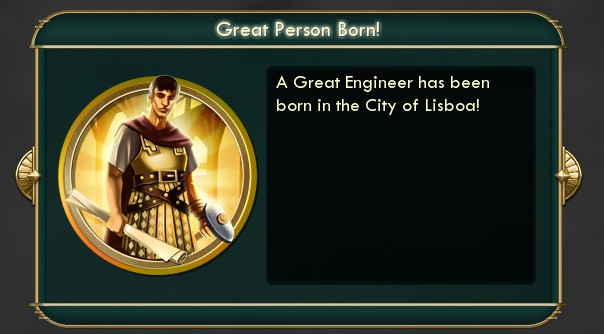
In this time of focus on learning and growth, a visionary philosopher decided to turn his attentions to the matter of the Portuguese manufacture, and how a few improvements might be applied to the benefit of the city.
This is our first example of a Great Person achieved through our Wonder development. Most Wonders and Specialists (more on those later) add a per-turn Great Person score to our City, and certain buildings increase the rate at which Great People are earned. Once the score passes a certain threshold, a Great Person is earned.
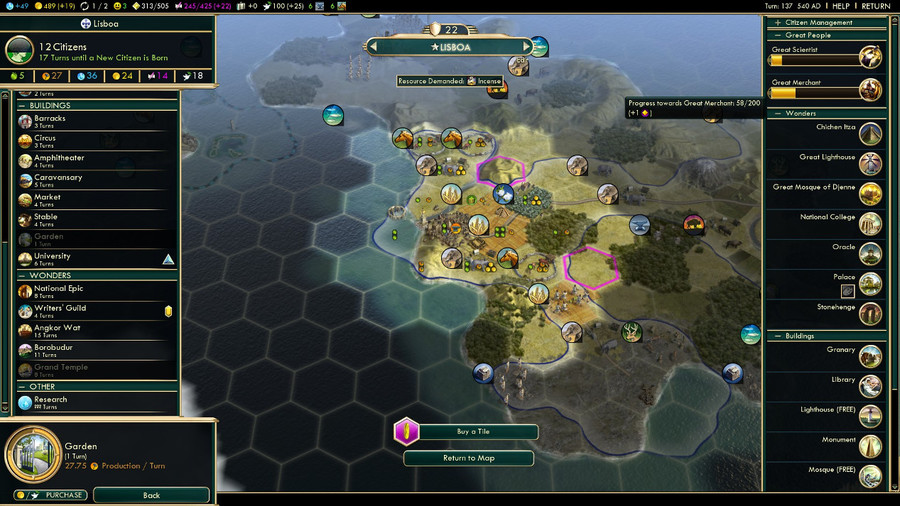
Great Engineers afford nice Production benefits. They have the option of either working in a City to give a huge one-time production boost that will basically slingshot a Wonder to near-instant completion, or can create a Manufactory improvement on a separate tile which gives it a large jump in Production.
After some soul-searching, the man called Arquimedes decides to create an advanced shipyard in the hills of Lisboa in order to ensure that some degree of his knowledge of infrastructure survives him.
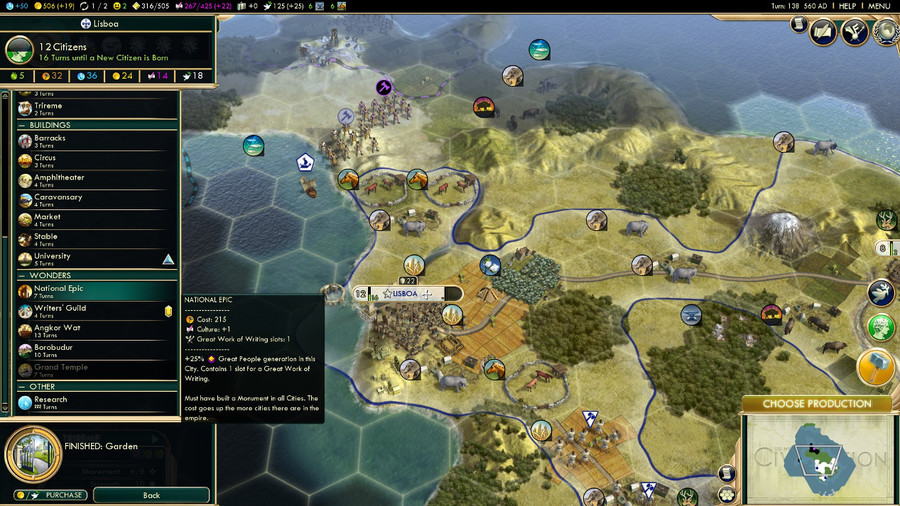
His example and the sacrifices of his contemporaries inspires a group of Portuguese poets and songwriters to immortalize their efforts in their craft. The resulting song, however, has since been lost to history.
Gardens and the National Epic each increase spawn rates for Great People by 25%, rounded down, so between the two of them our 3 Great Engineer points per turn increases to 4.
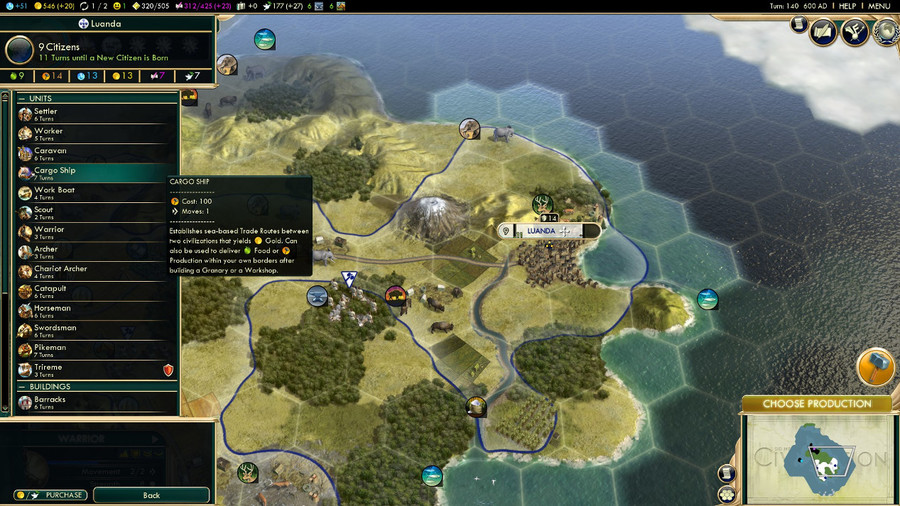
Luanda, meanwhile, begins the practice of shipbuilding gleamed from their Lisboan contemporaries, with the aim of eventually starting their own trade.
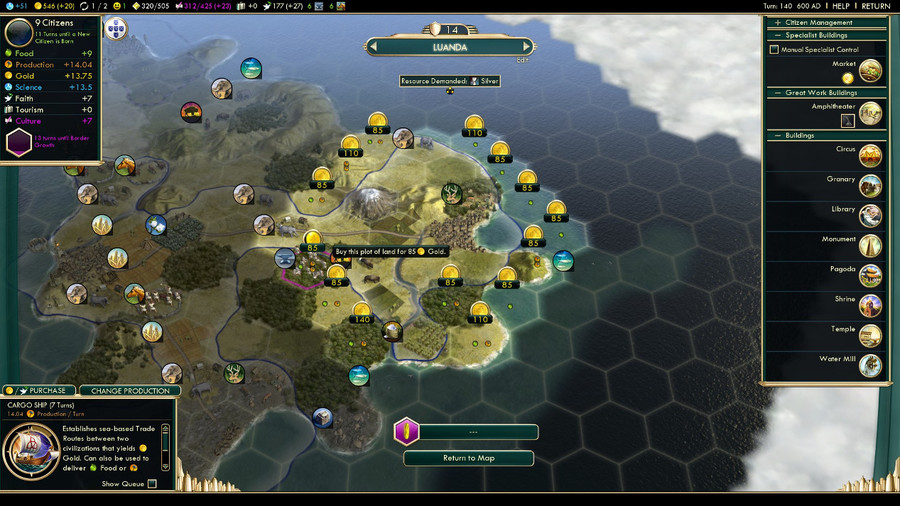
In order to support the development, a plan is made to expand the border to a nearby forest which the Workers have claimed contains an iron vein.
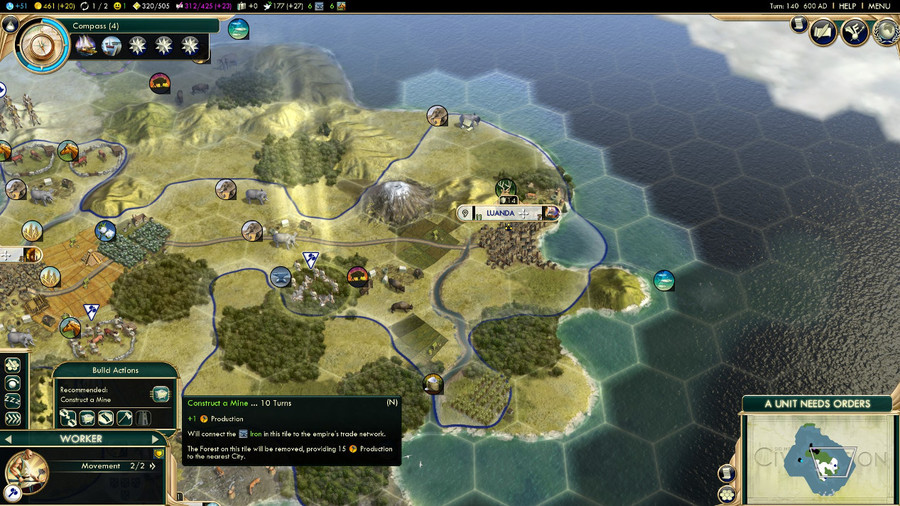
When building a Mine improvement over a Forest, some extra turns have to be taken to clear the Forest tile first. When the clearing is done, the nearest City to the Forest gets a small production spike that should take a turn or two off of a smaller project.
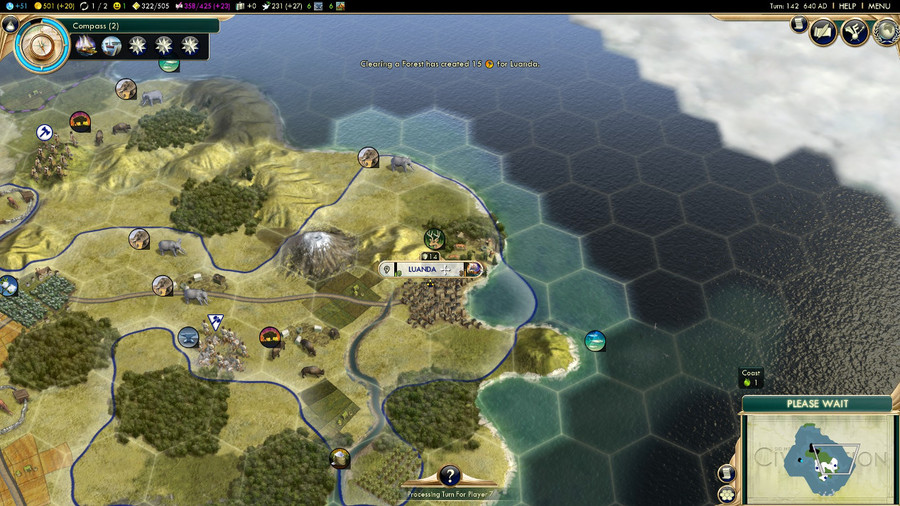
Just so.
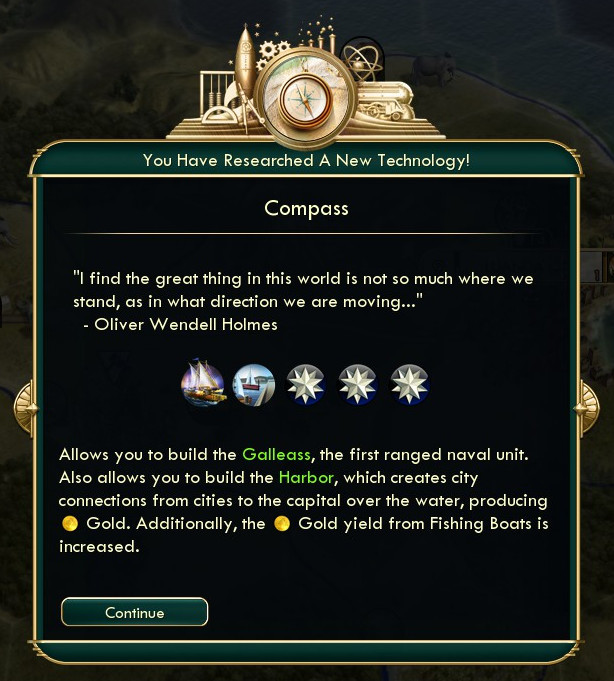
Using strange slivers of iron gleamed from the Luanda site, local scholars develop a device that consistently indicates the direction of the northern coast, thus enabling new types of navigational processes.
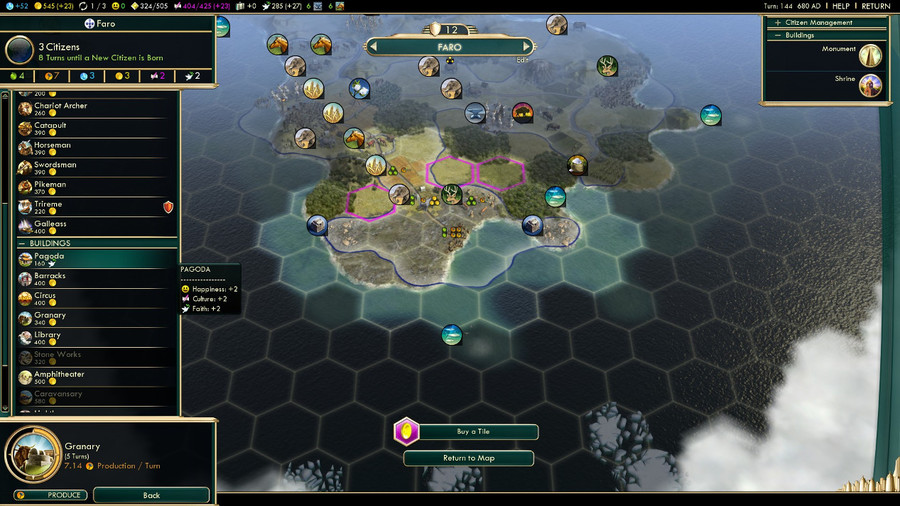
The clergy makes a visit to Faro, as they have begun adoption Sebastianist tenets from neighbouring cities. Consequently, the cold earth is blessed with a new Pagoda.

Though other lands may be gleaming God's favour, Dona Maria knows that her piety is second to none.
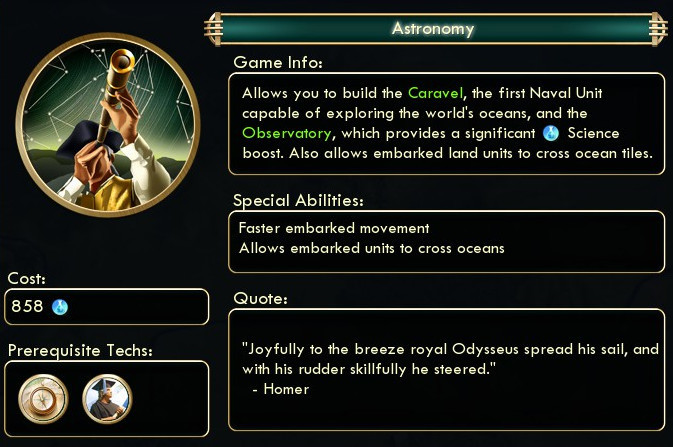
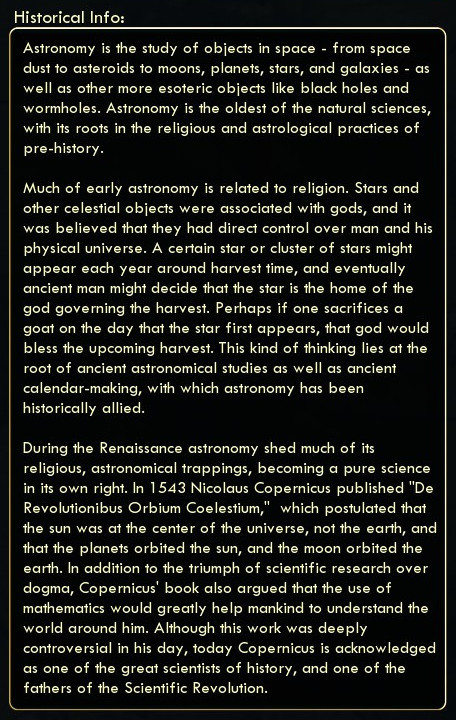
At this time, decisions must be made.
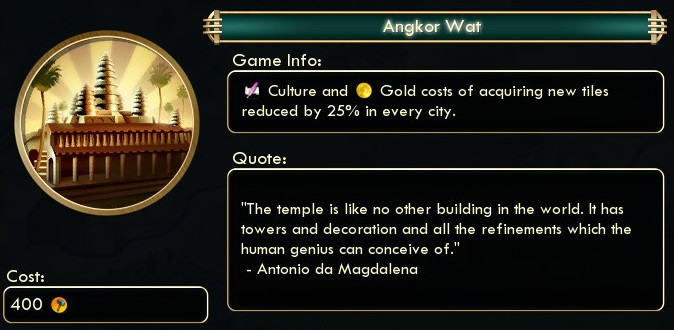
There are possibilities for the future that need to be considered carefully.
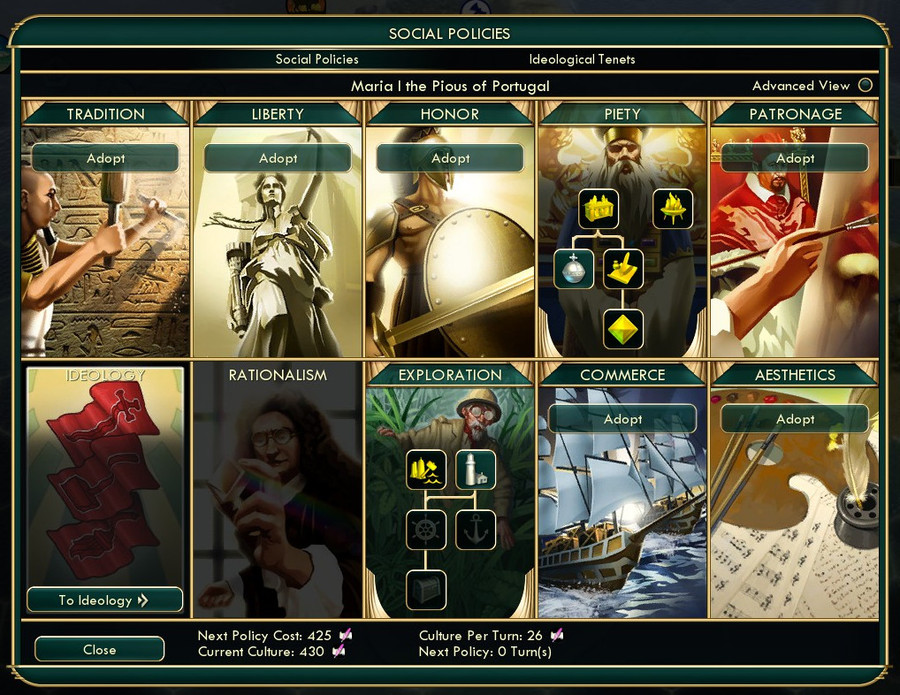
Dona Maria knows, though, that there is a time to pause and consider future actions, and a time to act.
It is now time to act.
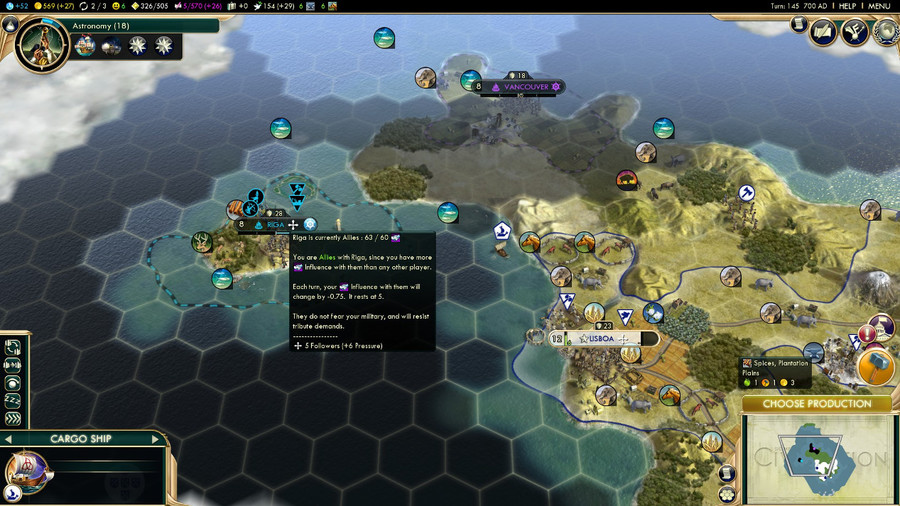
Dona Maria declares that the nation of Portugal shall forevermore support the growth and spread of Sebastianism, and her full dedication to Piety is recognized by the appearance of yet another great holy man in Lisboa. Joyful fervour sweeps the streets of Riga, and the Lord Mayor of the City-State eagerly signs a treaty with the Sebastianist nation.
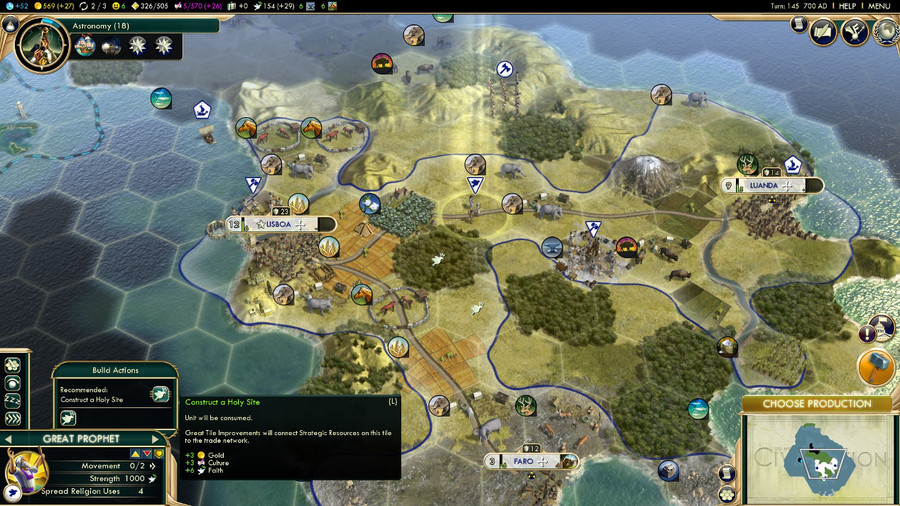
The holy man, formerly an engineer descended from the ranks of the Workers who created the Via da Rainha, performed a rite of consecration near an elephant graveyard off the side of the Road.
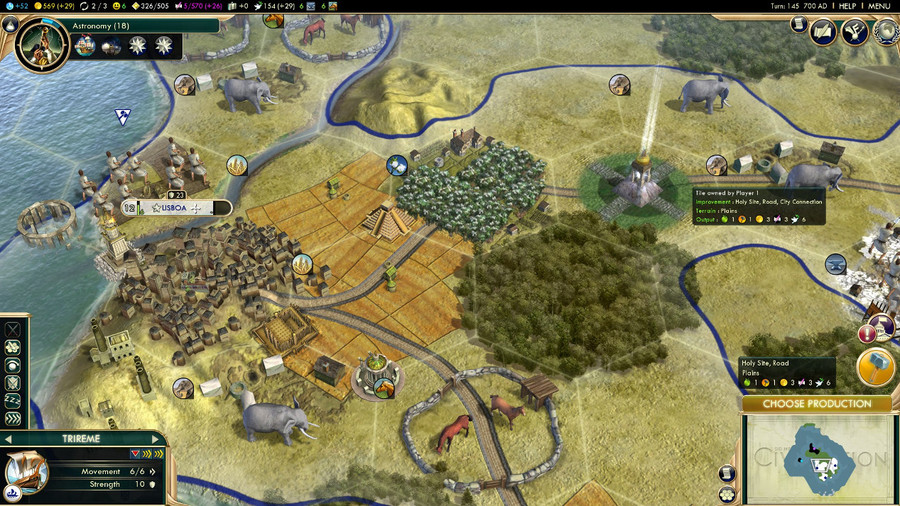
The new Holy Site began to attract Sebastianist thinkers and philosophers, who donated money to the church that sprang up nearby, which in turn was donated to Dona Maria's coffers for the good of the realm.
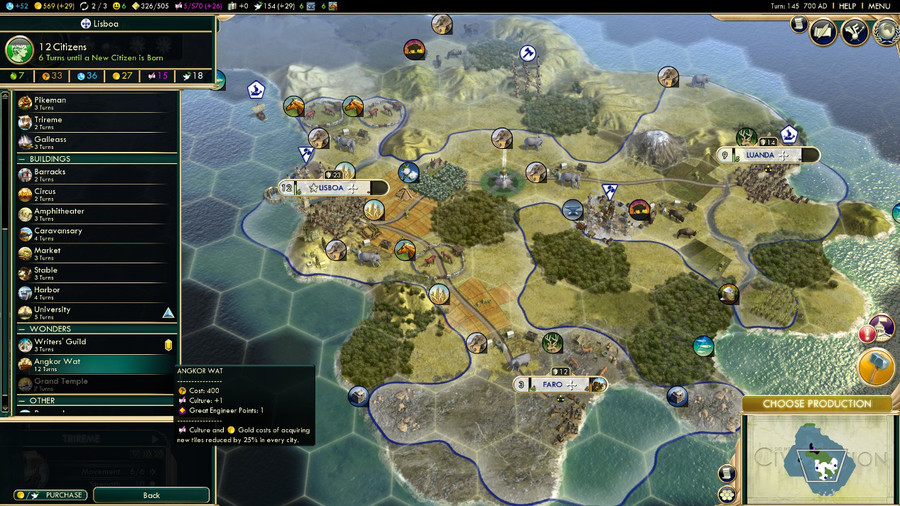
Thinking ever of things to come, Dona Maria commissioned the creation of yet another temple, one vast and large enough to be a city in its own right. The nation's architects were apprehensive, but took to the project with vigour.
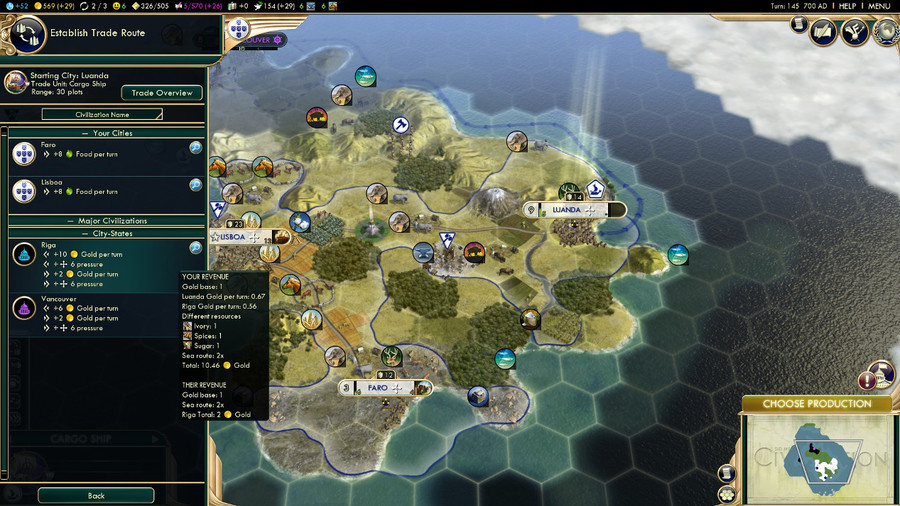
Luanda, meanwhile, began the pursuit of commerce. Between this and the practice of Sebastianist temples supporting government coffers, it became quickly known that the accumulation of wealth, far from a sin, was a virtue, if approached in pursuit of improving the lives of your fellow hunters.
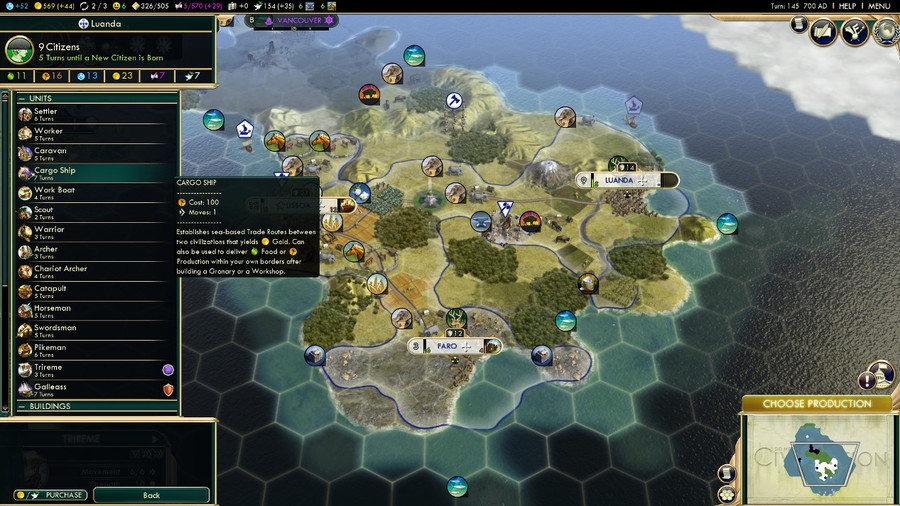
Consequently, Luanda began the creation of a second trading vessel, in the hopes of potentially eclipsing Lisboa as the centre of Portuguese commerce.
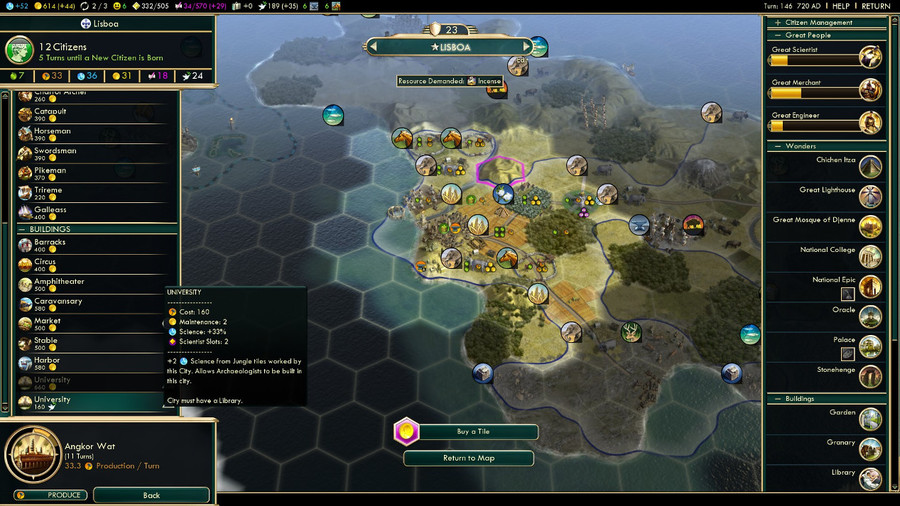
The scholars of the Universidade de Lisboa were shocked to learn that this newly wealthy clergy, with support from the Crown, were in the process of creating a second institute of learning. The Universidade, still the most popular institution for higher learning in the nation, was thus driven to demonstrate excellence in the face of competition.
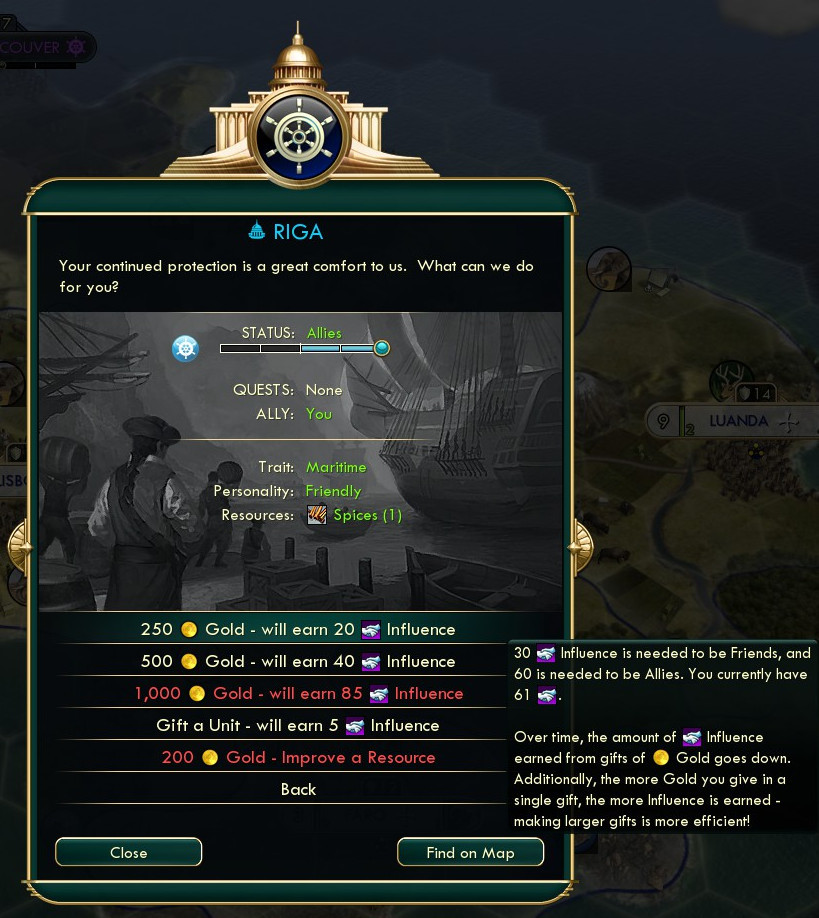
Once the joy at the advancement of Sebastianism began to fade, Riga began to express some remorse at their declaration of allegiance to Portugal. In order to ensure that the allegiance continued, Dona Maria decided to include the royal treasury in the negotiations, promising Riga wealth in exchange for the continuation of the alliance.
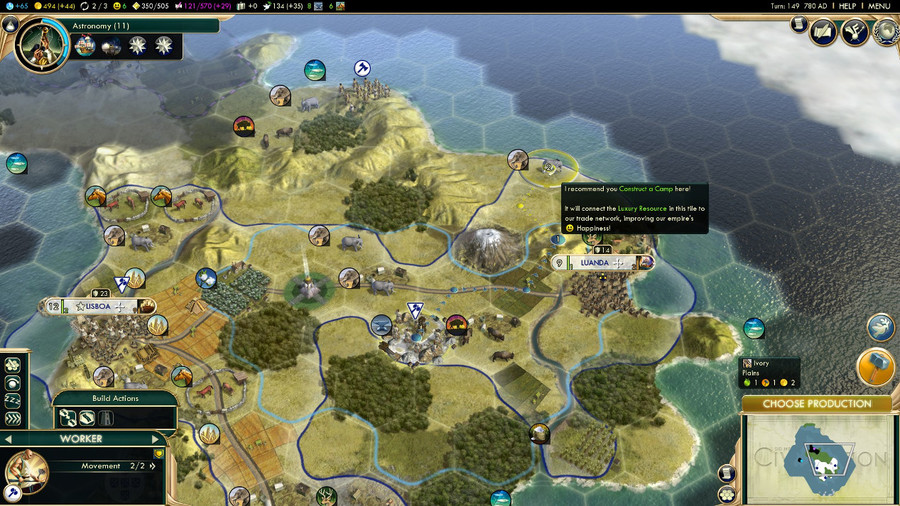
The Workers began moving back to Luanda to construct another Camp on the city's behalf.
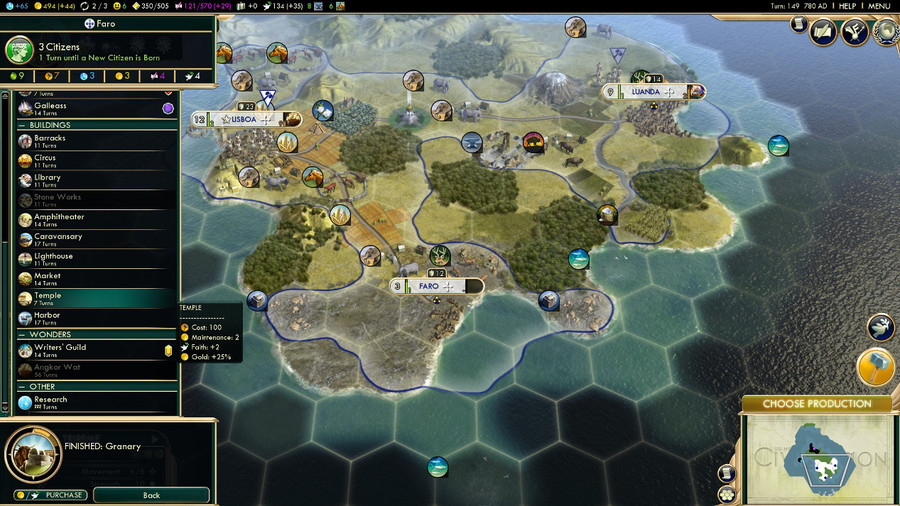
Faro followed suit with a temple to support their own economic growth.
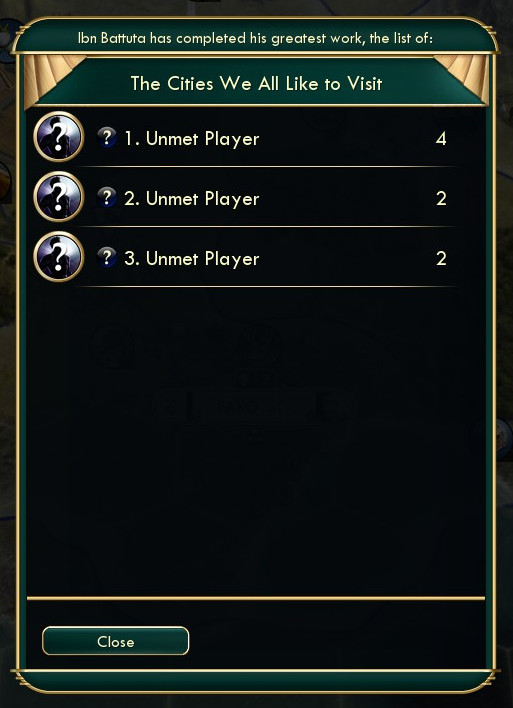
Dona Maria claimed that she wanted to visit the Parthenon and read some of the world's greatest literature, but when pressed for details she found herself unable to describe what she had seen to the satisfaction of local clergymen.
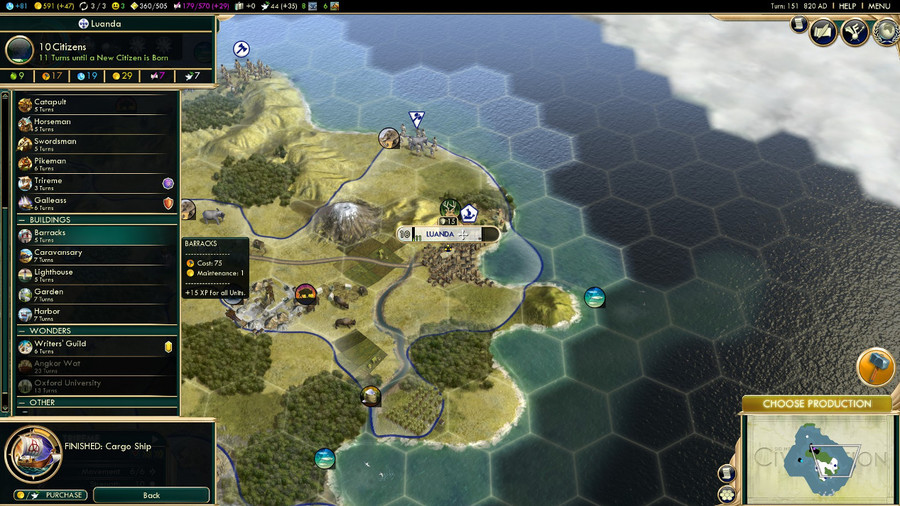
Luanda, ever creatively planning for the future, decided that some military development was in order.
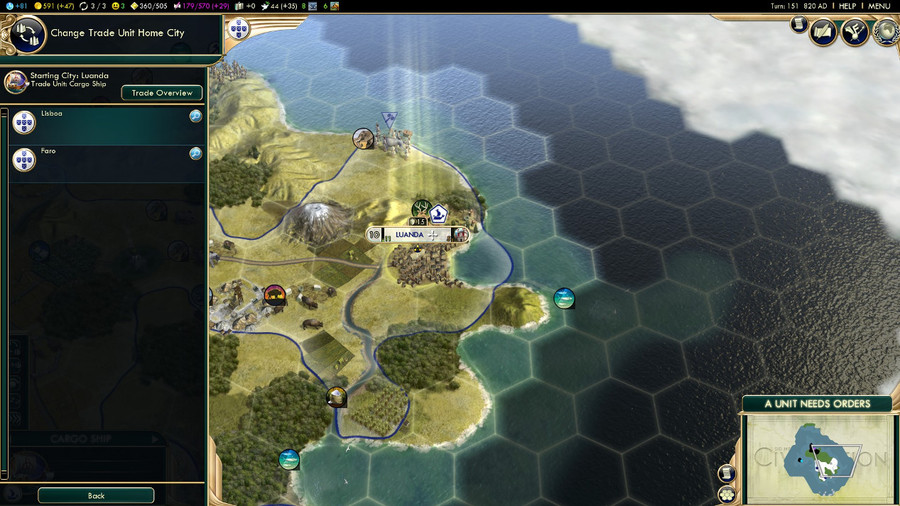
The Cargo ship, however, was relocated at Dona Maria's request to Lisboa to accomplish a different objective.
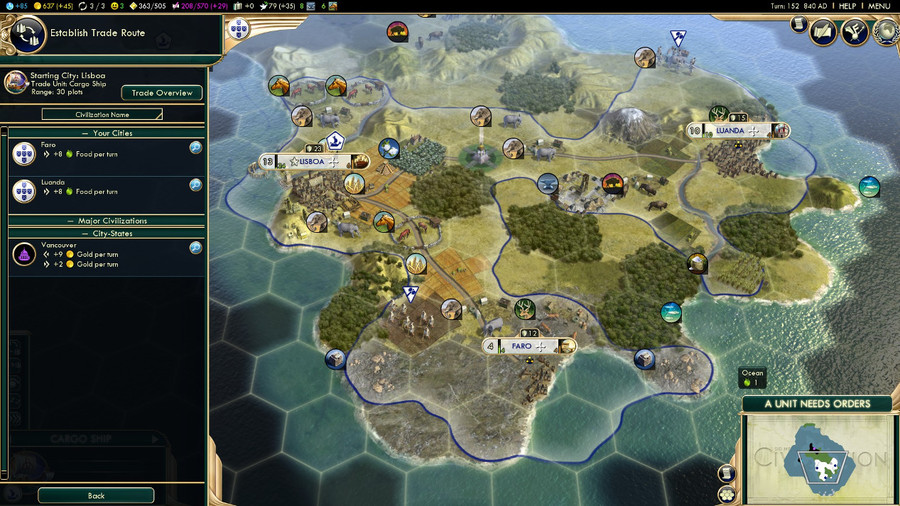
Though Dona Maria considered further trade with as the yet unenlightened peoples of Vancouver, the people of Lisboa instead directed trade towards their own in Faro, so that it could grow more quickly and generate more wealth for the nation.
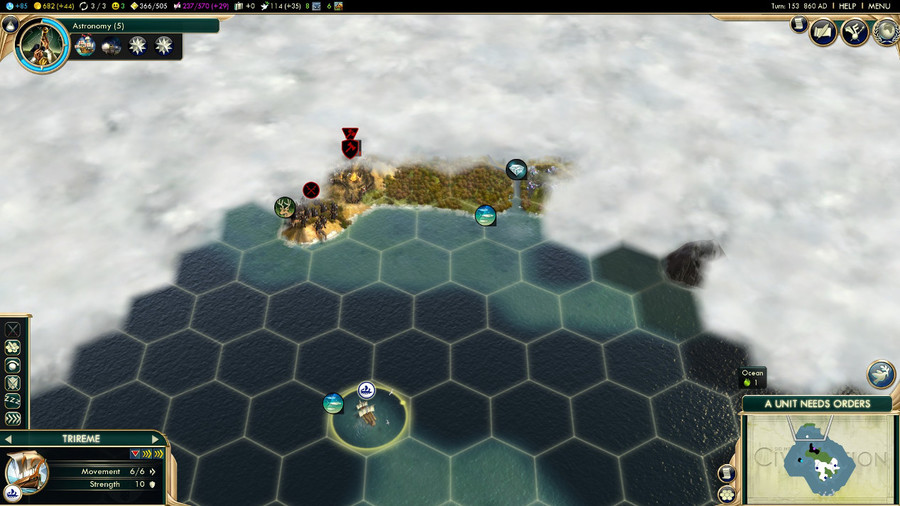
Suddenly, reports from the Trireme flooded in that there was some sort of altercation among the people to the northern lands. Dona Maria, retreating to her chambers, was then visited by an unusual vision.
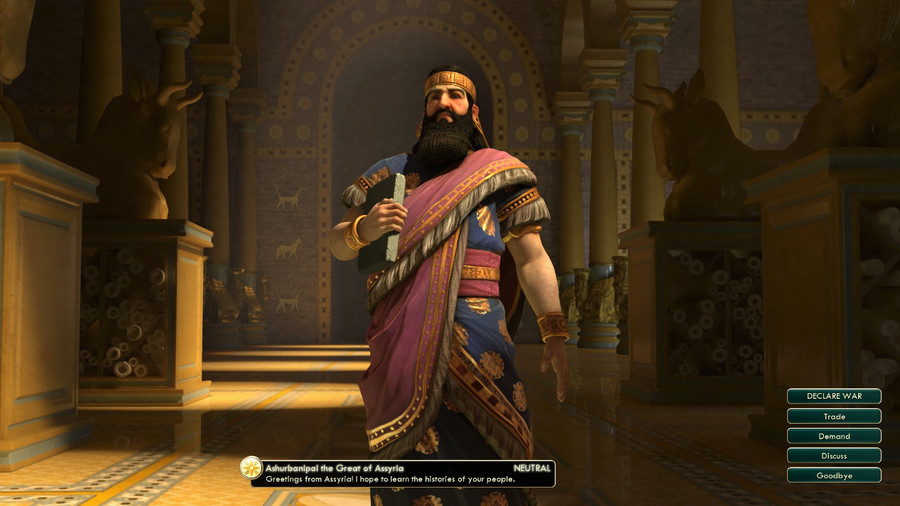
She imagined herself speaking to a man from these distant lands, amidst a backdrop full of strange icons and stone sculpture immaculately shaped. The man appeared fierce and scholarly, perhaps a hunter and philosopher like her own people, yet she discerned a sort of dangerous aggressiveness from his demeanour. She could tell that he styled himself something of a conqueror, an apex predator among men. He introduced himself as Ashurbanipal, and though his words were strange, their intended meanings seemed quite apparent to her.
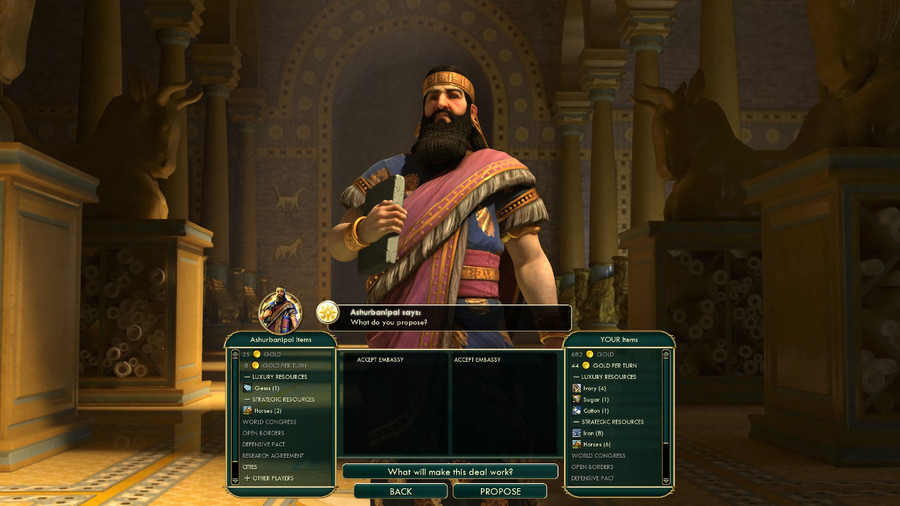
They discussed trade, and she learned that he was afflicted with a spiritual poverty, which manifested as a lack of wealth. She offered his people a chance to undertake diplomacy on closer terms, and when he accepted, she awoke from her dream.
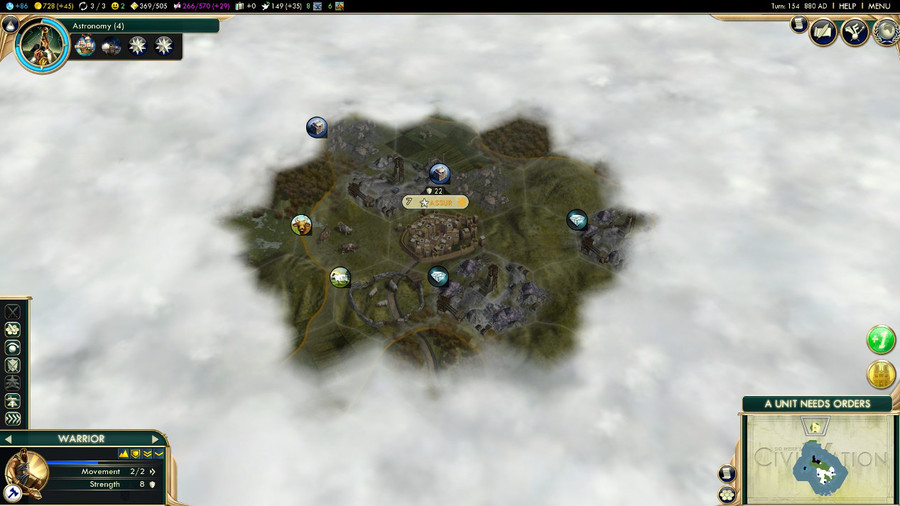
Emerging from her royal chambers, Dona Maria presented her navigators with an immaculately detailed map of the lands to the north she had seen in her dream. Though apprehensive of its contents, they agreed to consider it in relation to the rest of the continent that they were observing northwards.

Yet, Dona Maria's strange assertions of strange events taking place around the world were rarely wrong.
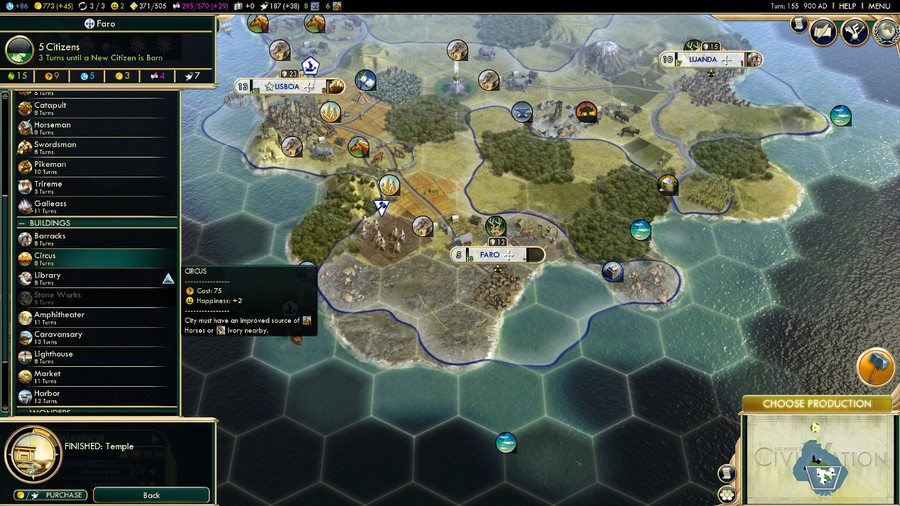
Faro, still developing, decided that entertainment would be their next step to developing as a city of their own, as the locals sometimes needed to be distracted and sheltered from the cold.
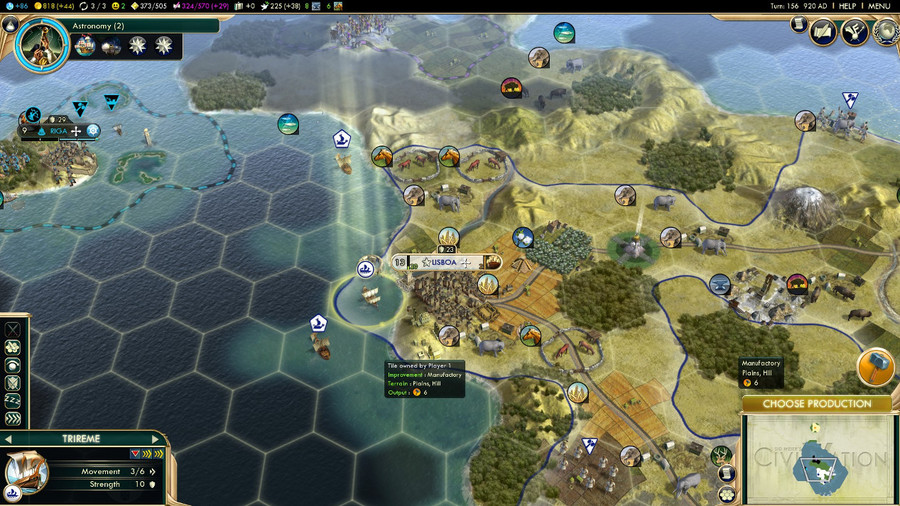
The Trireme, meanwhile, was commanded to return to port so that it could undergo some sort of refitting project at Arquimedes' shipyards.
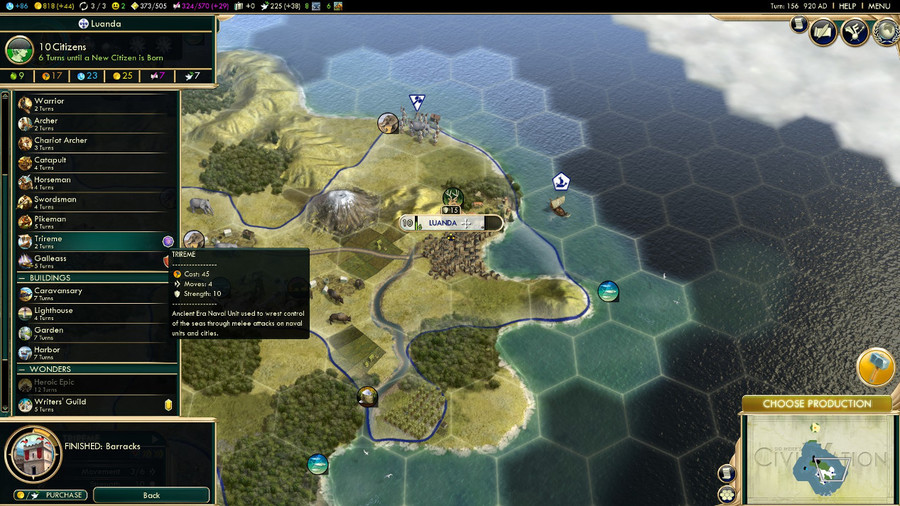
Luanda completed the Barracks and decided to begin their own military ship construction, though unbeknownst to them, they were doing so using outdated designs that Lisboa were already beginning to scrap.
This is a curiosity. When you start a building project for a unit about to be rendered obsolete by a new Technology (in this case, a Trireme being upgraded to a Nau) then the progress on the lesser unit gets transferred to that of the upgraded unit when the Technology is complete. I was curious to see what happens when a Technology and its un-upgraded unit complete simultaneously, but the Technology actually finished first.
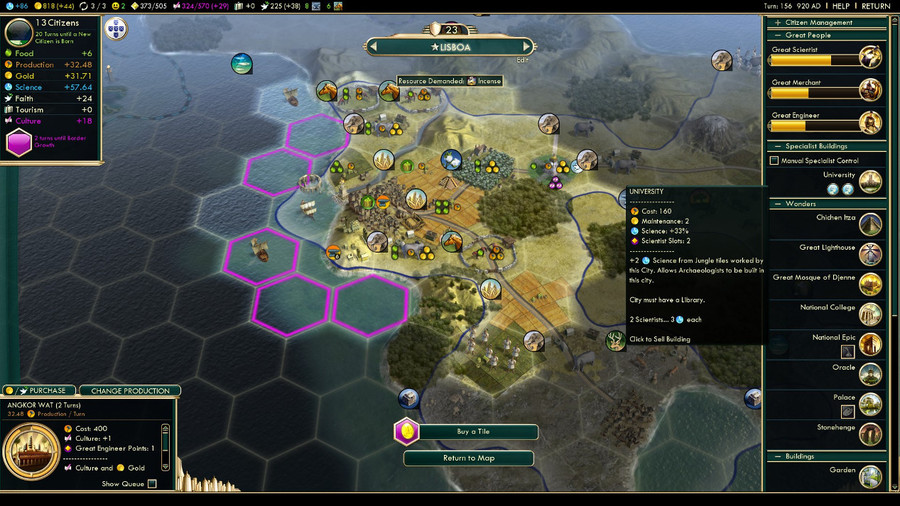
The new Universidade de Sao Sebastião was attracting a larger overall number of students and faculty than its National counterpart, and this popularity was reflected in its peoples' desire to dedicate themselves to the lifelong process of learning in a more permanent milieu.
Specialists are spaces for Citizens to work that are within the City, and not using tiles that are in the surrounding environment. The yields are usually lower, and they are tied to whichever building has space for Specialists, but in this case we get +3 science per Specialist, and they also contribute points to the Great Scientist counter, meaning that a Great Scientist will likely be the next one to trigger in Lisboa.
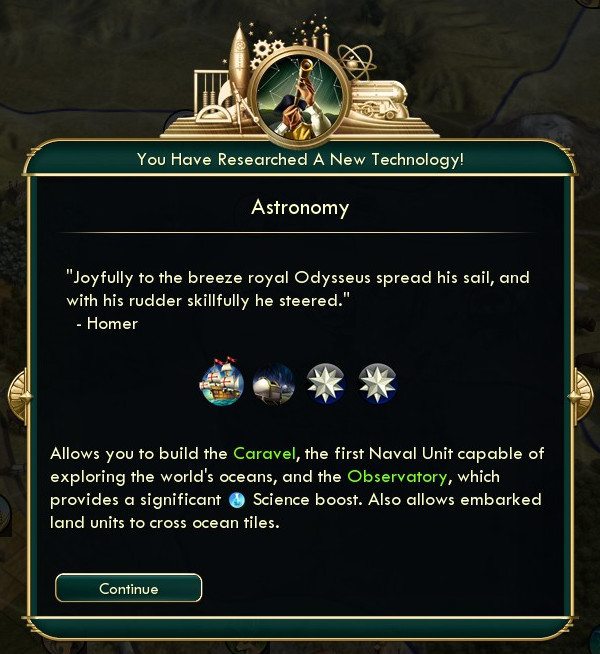
Finally, with their eyes on the stars, the shipwrights of Lisboa had unveiled their plans for their greatest undertaking yet. A vessel with a sturdy hull and lots of cargo space that would allow the people of Lisboa to finally traverse the distant oceans into far-off lands.
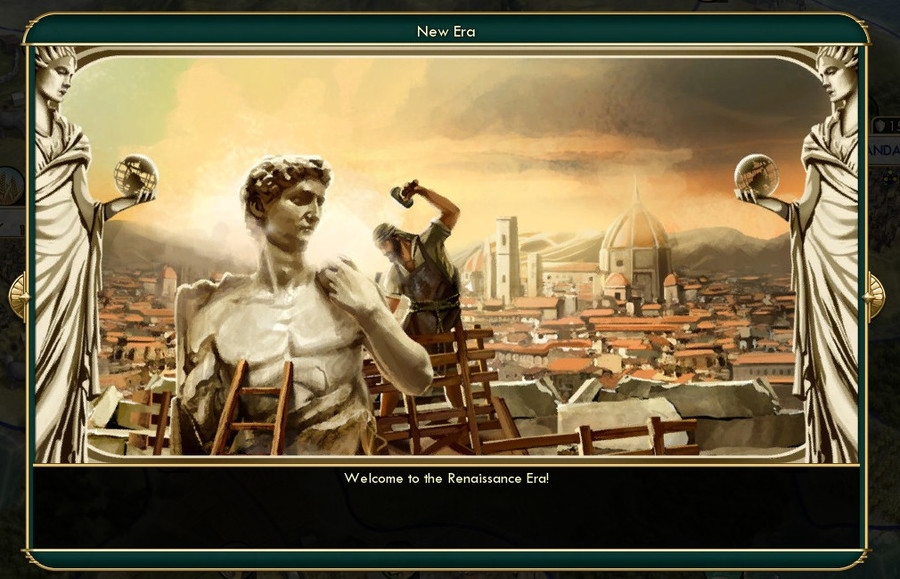
With this, a new era of discovery lay open for the people of Portugal, and it was their intention to make their presence known.
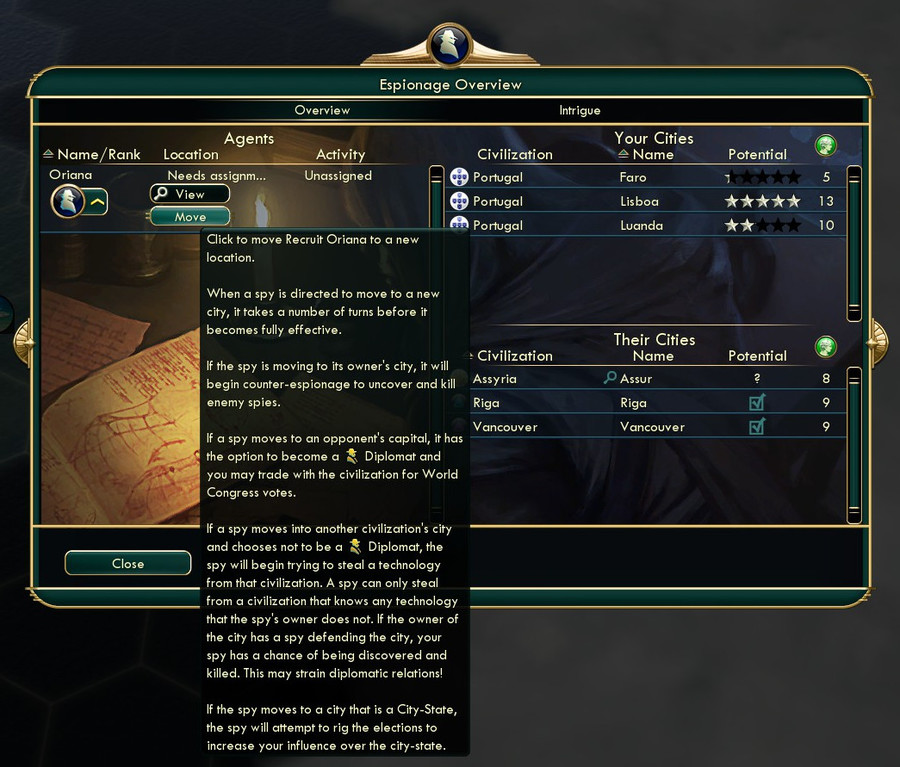
Dona Maria, however, knew that their presence would have to be announced in a subtler fashion.
Once a Civ reaches the Renaissance, all Civs gain access to Spies. Spies offer a few options for interacting with other Civs or City-States, by either stealing technologies, regularly offering Influence boosts, or killing enemy spies that try to take Technologies from you.
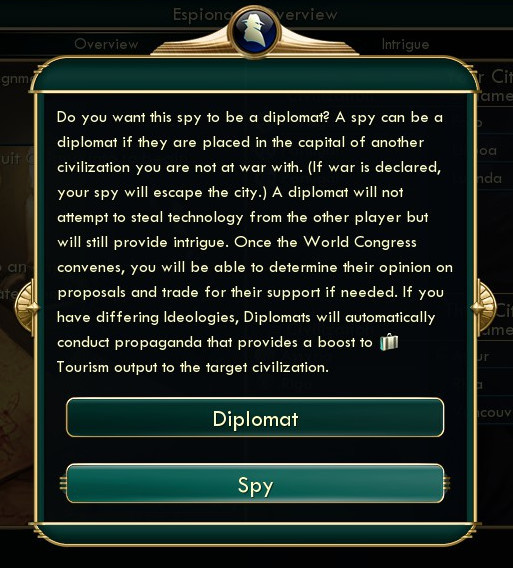
Senhora Oriana, who was originally trained as a huntress, was instead being sent to Ashurbanipal's lands to act as a subtler hunter of information and ideas. Dona Maria was hopeful that she would learn much of the world around her from the experience.
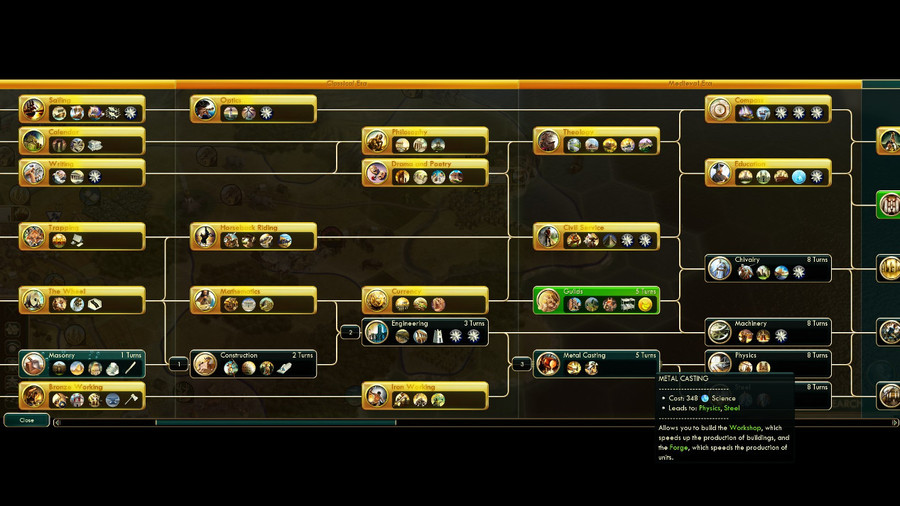
Plans were made to expand on Arquimedes' ideas by developing materials manufacturing industries in order to support Lisboa's soon-to-be-growing naval forces.
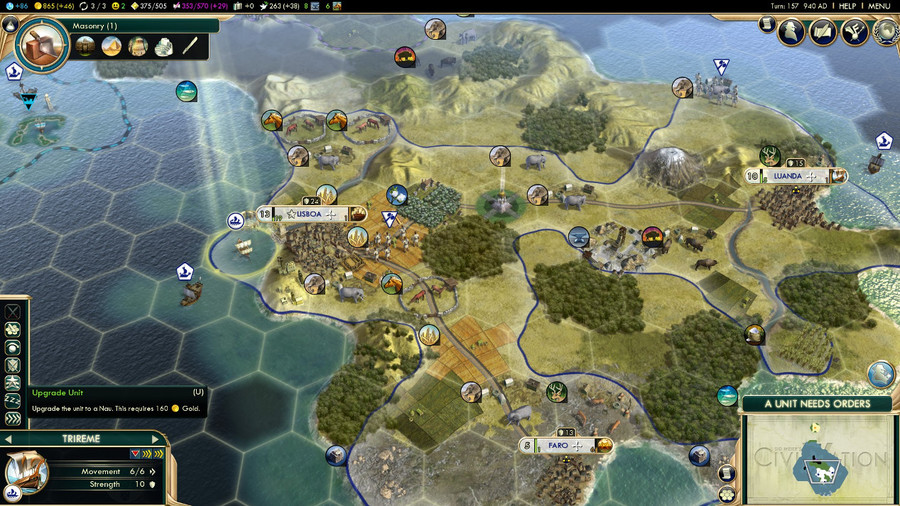
The Trireme was stripped of its hull and reborn as the first of the experimental "Nau" crafts. The results were as yet undetermined.
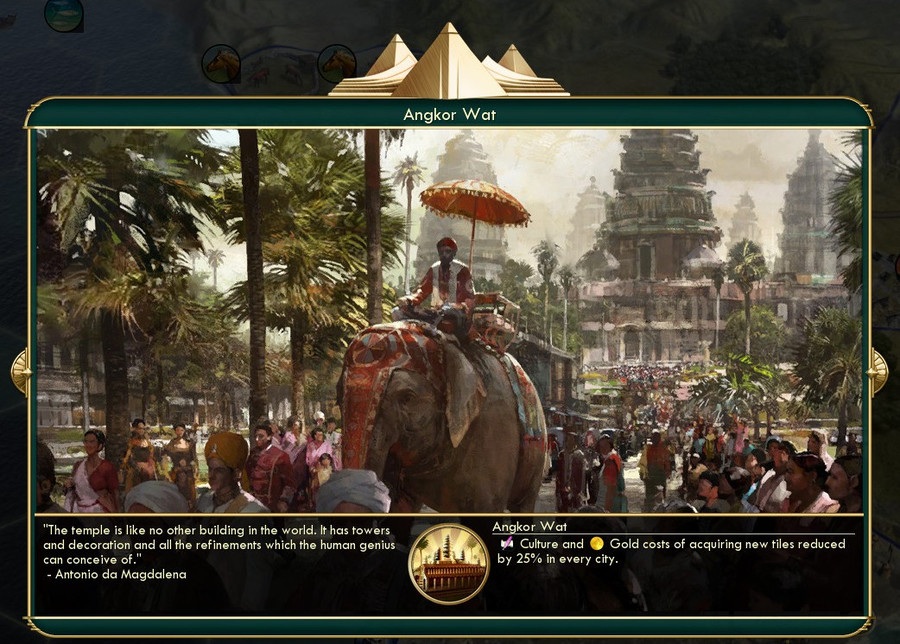
However, if the results of other building projects were any indication, then Dona Maria had no reason to believe that this one would be any less successful.
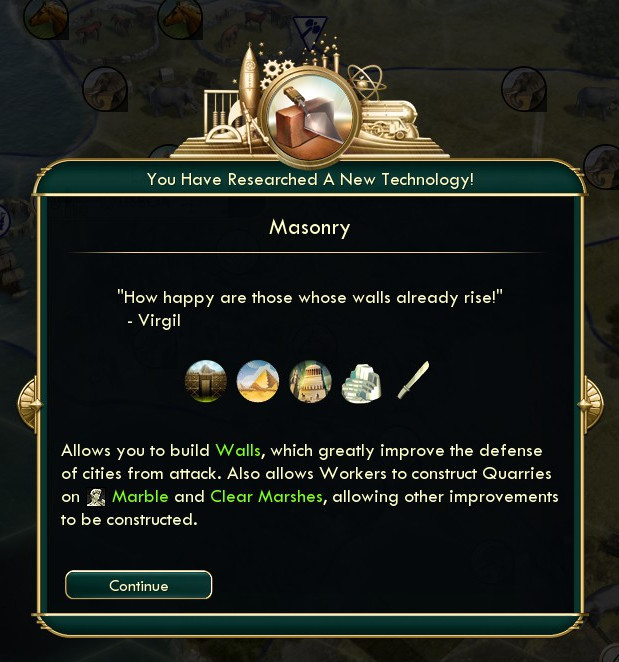
Dona Maria was insistent that her earlier dreams of communication with Ashurbanipal as to the nature of shaping stone for the purposes of sculpture were accurate. Her ranting, however inspired some the members of both Universidades to put her ideas into practice.
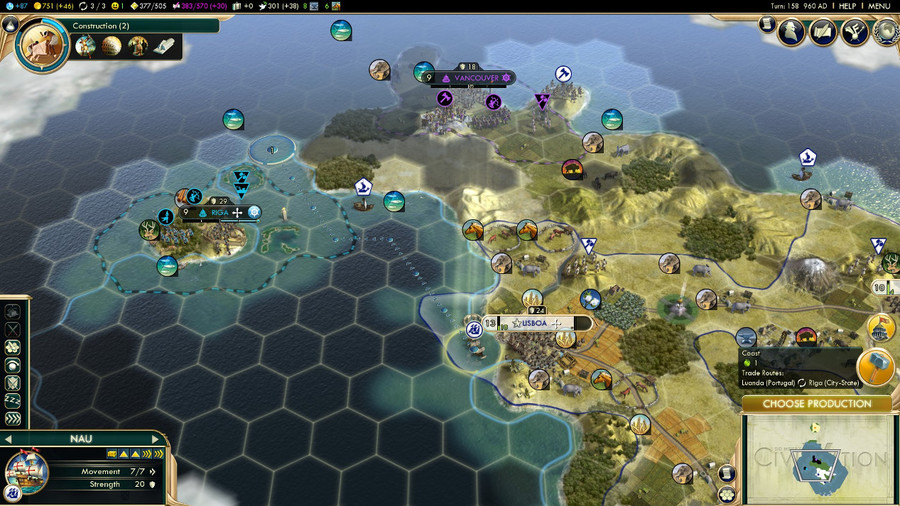
The Nau was also delivering on its promise of being able to cross the seas with alacrity.
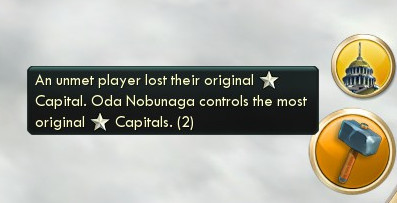
However, signs were apparent that there was reason to be concerned for the future when it potentially held danger for other lands.
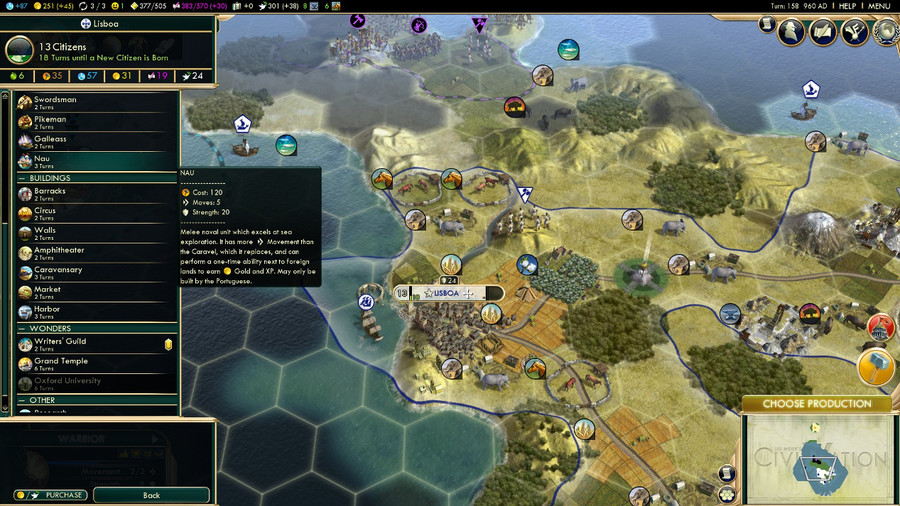
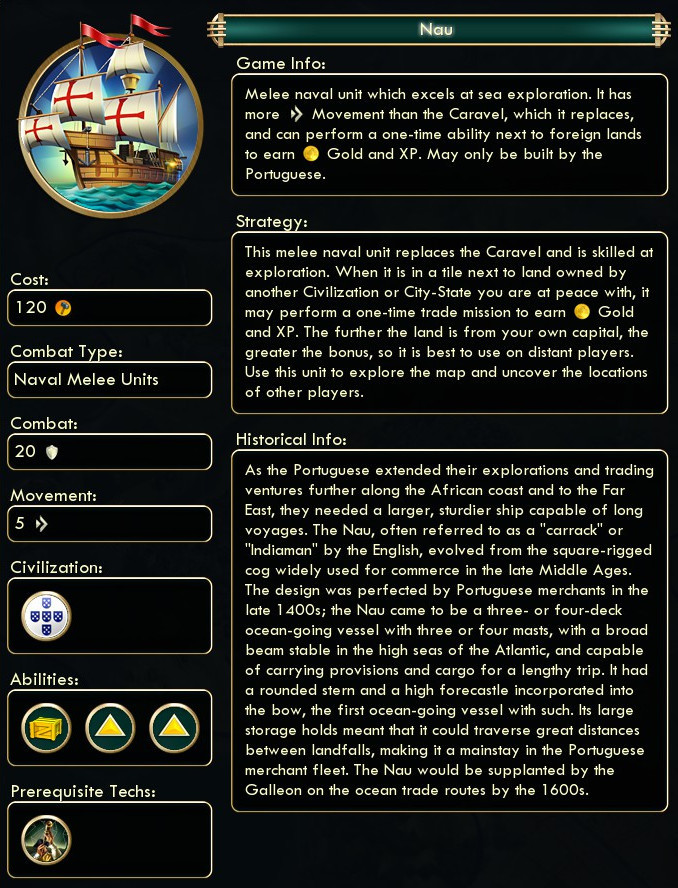
Yet, with the wind at the backs of the Portuguese, they needed to see the world first before casting their judgement upon it.
However, for now, judgement needs to be made on another issue.
We have met our first fellow Civ. In general, how should we treat Ashurbanipal?
We can treat him Favourably by offering him trade, enlightening him with Sebastianism and generally trying to avoid creating discord.
We can treat him Indifferently by ignoring his requests, foregoing trade opportunities in favour of working with others, and generally not attempting much diplomacy.
We can treat him Unfavourably through declarations of war, denouncements, and acts of subterfuge aimed at undermining and eventually conquering him.
Further, we have a Social Policy to adopt in the near future.
Now that we are in the Renaissance, we can branch into the tree called Rationalism which will allow us to gain more Science. The opening ability offers +10% Science from all sources when we have a net positive to our Happiness, and eventually allows us to build the Porcelain Tower wonder and get benefits from Specialists and bonus Science from trade buildings, among other benefits.
However, I believe there is also value in continuing to develop the Exploration tree we have started, or maybe splashing into Patronage so that we may better curry favour with new City-States we will encounter.
However, these are your decisions to make, so feel free to choose any Social Policy available to us. I will close the voting at the end of the day on Monday.
Até segunda!